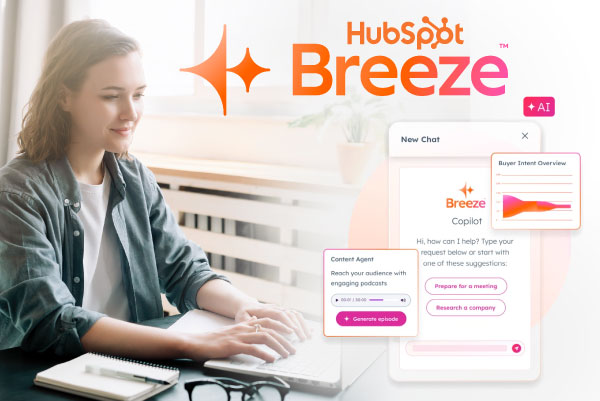HubSpot and Microsoft Dynamics 365 are leading sales, marketing, and service systems for organizations hoping to streamline and automate activities. However, key differences between these two software products will determine which is a better fit for your business.
SMB vs. Mid-Market & Enterprise Software
Features
HubSpot Features:
- Sales Hub: Account management, pipeline forecasting, and lead scoring
- Marketing Hub: Lead scoring, email and social media marketing, and marketing automation
- Service Hub: Ticketing tools, customer portals, and a knowledge base builder
- Content Hub: SEO recommendations, content personalization, and a website builder
- Operations Hub: Data synchronization, workflow automation, and quality assurance
- Commerce Hub: Recurring payments, quotes with payment links, and a product library
Dynamics 365 Features:
- Sales – Management for leads, opportunities, contacts, and accounts
- Customer Insights (Marketing) – Multichannel marketing automation, lead conversion, and activity tracking
- Customer Service – Ticket management, customer communication tools, and a knowledge base builder
Suppose you’re eager to explore additional core and advanced module features offered by HubSpot and Microsoft Dynamics 365. In that case, our comparison report is the perfect resource for you. Explore a detailed side-by-side comparison report.
Pricing
Implementation Timeline
Implementing HubSpot CRM and Microsoft Dynamics 365 CRM follows a similar overall process: working with an implementation partner to configure the software, clean and migrate data, and ensure integrations are functioning properly. However, the complexity and timeline can differ between the two solutions.
A HubSpot CRM Implementation is known for its user-friendly interface and quick setup. While it offers robust customization, it’s also designed to work well out of the box. Its various Hubs integrate easily with third-party applications, making it simple to connect with your existing tools and get up and running quickly.
In contrast, Dynamics 365 CRM Implementaiton is a more complex, modular platform, which can result in a longer and more involved implementation process. Customizations tend to be deeper and more time-intensive, and while integration with Microsoft tools is typically seamless, connecting with third-party systems can require additional effort and expertise.
Both platforms are cloud-based, offering anytime, anywhere access for users with an internet connection. However, Dynamics 365 CRM also supports on-premise and hybrid deployments, which can be important for businesses with specific regulatory or infrastructure needs. An experienced implementation partner can help determine the right deployment and rollout strategy for your organization.
Integrations
Both HubSpot and Microsoft solutions are designed to work in tandem with software for other areas of your business, such as operations and accounting. However, the best integrations for these solutions differ.
HubSpot is designed to integrate with third-party solutions for a variety of tasks, whether you want to expand your sales and marketing capabilities or blend customer account data with financials. HubSpot’s App Marketplace is chock-full of the most popular and powerful solutions to extend HubSpot’s capabilities.
Businesses that invest heavily in Microsoft solutions are called “Microsoft shops.” Often, they use a combination of Dynamics 365 tools for CRM, financials, and operations, Microsoft 365 solutions like Outlook for productivity, and Power Apps for additional business insights. While Dynamics 365 CRM can sync with third-party tools, Microsoft-approved solutions have the most seamless connections.
Sum It Up
HubSpot CRM is a robust platform of sales, marketing, and service solutions designed to help your team attract, engage, and delight customers. Designed for small to mid-sized businesses, HubSpot is an affordable option that integrates seamlessly with countless third-party solutions. And, since it’s cloud-based and easy to use right out of the box, it’s easy to deploy and explore.
Microsoft Dynamics 365 CRM is a powerful platform of sales, marketing, and service software for mid-sized businesses and large-scale enterprises. The Dynamics 365 CRM modules are a great addition to any business that’s already using Microsoft solutions for operations, finance, and productivity.
HubSpot vs. Dynamics Comparison Report

Take advantage of our side-by-side comparison report by entering your information: ►

Let’s Chat
Still have questions? Get in touch with our expert team of software professionals.


